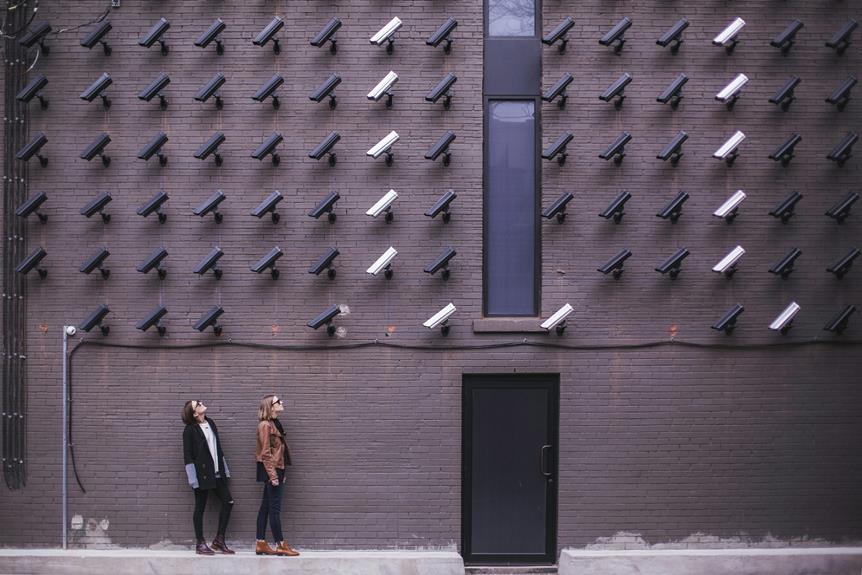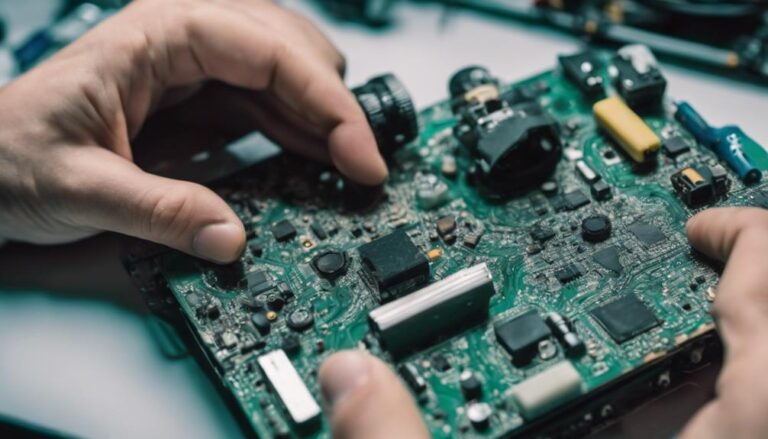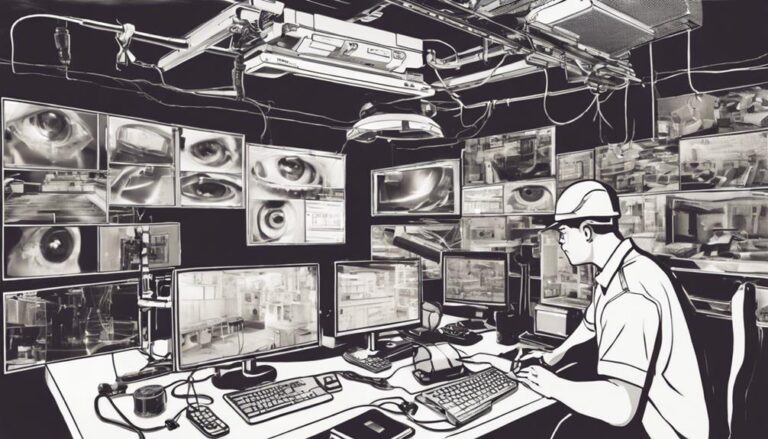When comparing Dahua and Hikvision CCTV systems, you’ll notice compelling differences. Dahua offers high-resolution options up to 12MP and smoother video playback with 60 fps, while Hikvision also provides impressive resolution and frame rates. Dahua excels in local storage options like NVRs and SD cards, whereas Hikvision shines with advanced cloud storage capabilities. For ease of use, Dahua‘s interface is more straightforward, while Hikvision offers deeper customization. Price-wise, Dahua tends to be more budget-friendly. Both brands provide robust support, but installation is simpler with Dahua’s plug-and-play systems. Interested in more detailed insights? Keep going.
Video Quality
When comparing Dahua and Hikvision, you’ll notice that video quality greatly influences your choice. If you’re someone who values freedom and flexibility, the resolution options and frame rates offered by both brands can be a game-changer. Dahua tends to offer a wide range of resolution options, from standard 2MP cameras up to ultra-high-definition 12MP models. This variety allows you to choose a camera that fits your specific needs without being tied down to a one-size-fits-all solution.
On the other hand, Hikvision also provides impressive resolution options, often matching Dahua’s offerings. Whether you need high-definition footage for clear facial recognition or just a basic setup for general surveillance, Hikvision has you covered.
Frame rates are another critical factor. Dahua cameras typically support higher frame rates, up to 60 fps, ensuring smooth video playback. This is particularly beneficial for capturing fast-moving objects or ensuring that no detail is missed. Hikvision is no slouch either, often offering similar frame rates, but it’s worth double-checking specific models to meet your exact requirements.
Ultimately, both brands give you the freedom to tailor your security system to your unique needs, thanks to their diverse resolution options and robust frame rates.
Storage Options
While video quality is paramount, how you store that footage is equally important when choosing between Dahua and Hikvision. Both brands offer flexible storage options, but they cater to different needs and preferences.
Dahua provides a robust suite of storage solutions. If you value control and autonomy, you’ll appreciate their extensive local storage options. Dahua supports a variety of local storage devices like NVRs (Network Video Recorders) and SD cards. This means you can store your footage on-site, giving you immediate access and full ownership of your data.
Hikvision, on the other hand, excels in cloud storage capabilities. If you’re always on the go and want the freedom to access your surveillance footage from anywhere, their cloud storage solutions are a perfect fit. Hikvision’s cloud services offer scalable storage options and easy remote access. This flexibility ensures that even if local storage fails, your data remains secure and accessible.
Ultimately, the choice between Dahua and Hikvision boils down to your personal preference for local versus cloud storage. If you lean toward self-reliance and direct control, Dahua’s local storage options are ideal. Conversely, if you crave the freedom of remote access, Hikvision’s cloud storage solutions will serve you well.
Ease of Use
Both Dahua and Hikvision offer user-friendly interfaces, but there are notable differences in their ease of use that might sway your decision. With Dahua, you’ll find an intuitive user interface designed to get you up and running quickly. Their mobile app is straightforward, offering seamless remote access so you can monitor your property from anywhere. The simplicity of their layout means fewer clicks to get to what you need, making it less of a hassle to navigate.
Hikvision, on the other hand, provides a more robust user interface that might seem overwhelming at first but offers more customization options. If you’re tech-savvy and enjoy tweaking settings to suit your specific needs, Hikvision might be more up your alley. Their remote access capabilities are also excellent, though the initial setup can be a bit more complex compared to Dahua.
For those who value freedom and ease of use, Dahua’s straightforward approach could be more appealing. However, if you desire greater control and don’t mind a steeper learning curve, Hikvision’s extensive feature set might be worth the extra effort. Ultimately, your choice depends on whether you prioritize simplicity or customization.
Pricing
When it comes to pricing, Dahua generally offers more budget-friendly options compared to Hikvision. If you’re looking for a cost-effective solution without compromising much on quality, Dahua might be the way to go. Their pricing structure is more accessible, making it easier for you to set up a reliable security system without breaking the bank.
Now, Hikvision tends to be on the pricier side, but they often justify this with advanced features and robust performance. If you’re willing to invest a bit more for higher-end technology, Hikvision’s offerings can be worth the extra cost. However, be mindful of their subscription models. Some of Hikvision’s advanced features might require ongoing subscriptions, which could add to your overall expenses.
Dahua also provides solid warranty coverage, often matching or exceeding what Hikvision offers. This means you can enjoy peace of mind knowing that your investment is protected.
Installation Process
Switching gears from pricing, let’s look at the installation process for Dahua and Hikvision systems. If you value your freedom and flexibility, you’ll want to know which system offers the easiest setup.
When it comes to wiring complexity, Dahua tends to be more straightforward. Their systems are often designed with a plug-and-play approach, reducing the need for extensive wiring work. This means you can get your system up and running without feeling like you’re tackling a major electrical project. Hikvision, on the other hand, can be a bit more intricate. You might find yourself dealing with more complicated wiring, especially if you’re setting up a larger, more all-encompassing system.
As for mounting options, both brands offer a range of choices, from wall mounts to ceiling mounts and even pole mounts. Dahua’s mounting options are generally user-friendly, making it easier to reposition cameras as needed. Hikvision also provides versatile mounts, but some users find them slightly more cumbersome to adjust.
Customer Support
When it comes to customer support, you’ll want to evaluate the response times and technical assistance offered by Dahua and Hikvision. How quickly each company addresses your issues can make a significant difference in your overall experience. Let’s explore how each brand stacks up in these critical areas.
Response Time Comparison
When it comes to customer support response times, Dahua typically outpaces Hikvision, offering quicker resolutions to user inquiries. For those experiencing issues with network latency or frame rate, prompt support is essential to maintaining peak performance. Dahua’s swift response can make all the difference when you’re troubleshooting these specific problems.
Here’s why Dahua’s response time is often preferred:
- Faster Email Replies: Dahua is known for responding to emails within 24 hours, whereas Hikvision might take up to 48 hours. This means you can get back to your smooth-flowing lifestyle without long delays.
- Quicker Phone Support: Dahua’s phone support often has shorter wait times. With Hikvision, you might find yourself on hold longer, which can be frustrating when you need a solution right away.
- Efficient Ticket System: Dahua’s ticketing system is streamlined for speed, often resolving issues within a couple of days. Hikvision’s ticket response tends to be slower, sometimes stretching into weeks.
In a world where time is of the essence, especially when dealing with tech hiccups, faster support can mean the difference between a quick fix and prolonged downtime. Choose wisely to keep your CCTV system running smoothly.
Technical Assistance Availability
Both Dahua and Hikvision offer robust technical assistance, but the availability and accessibility of their customer support services can greatly impact user experience. If you’re someone who values independence and swift solutions, understanding these differences is important.
Dahua provides technical support through multiple channels, including phone, email, and online chat. They also offer remote diagnostics, which means you can get issues resolved without waiting for a technician to visit. Plus, their firmware updates are regularly rolled out, ensuring your system stays up-to-date and secure. However, response times can vary based on your location and the complexity of your issue.
Hikvision, on the other hand, offers a more streamlined support system. Their customer service is known for being responsive and efficient. Remote diagnostics are a key feature here too, allowing you to troubleshoot problems from the comfort of your home. Firmware updates are similarly frequent, keeping your CCTV system functioning optimally. Hikvision’s global presence ensures that technical assistance is readily available, but it’s worth noting that the quality of support can differ across regions.
Software Integration
Software integration is an important aspect to keep in mind when deciding between Dahua CCTV and Hikvision systems. You want a seamless experience that allows flexibility and freedom to use various tools and applications. Let’s break down the differences:
- API Compatibility: Dahua systems offer robust API compatibility, making it easier for you to integrate their cameras with other software. This flexibility is essential if you want to customize your setup or incorporate advanced analytical tools.
- Third Party Applications: When it comes to third party applications, both Dahua and Hikvision have their strengths. Dahua’s open platform allows you to easily connect with a wide range of third-party apps, giving you the freedom to enhance functionality. Hikvision also supports third-party integrations, but you may find Dahua slightly more flexible in this regard.
- Native Software: Hikvision’s native software, iVMS-4200, is known for its user-friendly interface and extensive features. Dahua’s Smart PSS also offers a wide range of functionalities but may require a bit more tweaking to get everything just right. Your choice here depends on how much time you’re willing to invest in setup and customization.
Choosing between Dahua and Hikvision boils down to your need for flexibility and ease of integration, helping you decide which system grants you the most freedom.
Security Features
When comparing Dahua and Hikvision, you’ll want to examine their security features. Look at their encryption and data protection protocols, how accurate their motion detection is, and what user authentication methods they offer. These factors are vital for ensuring your surveillance system is both effective and secure.
Encryption and Data Protection
Understanding the encryption and data protection features of Dahua CCTV and Hikvision systems is crucial for guaranteeing your security setup is strong against cyber threats. In a world where data breaches are increasingly common, you want a system that not only captures high-quality footage but also safeguards that data. Let’s delve into how Dahua and Hikvision stack up in this critical area.
- Encryption Protocols: Dahua employs advanced encryption protocols like TLS (Transport Layer Security) and AES (Advanced Encryption Standard) to protect data during transmission and storage. Hikvision, on the other hand, also uses AES encryption along with a unique protocol called SSL (Secure Sockets Layer) to ensure that your data isn’t compromised.
- Firmware Updates: Both Dahua and Hikvision provide regular firmware updates to fix vulnerabilities and enhance security measures. With timely updates, you can confirm that your system is always protected against the latest cyber threats.
- User Authentication: User authentication is another layer of security where both brands excel. Dahua supports multi-factor authentication (MFA), while Hikvision offers robust password policies and user access controls to prevent unauthorized access.
These features empower you to maintain a secure environment, letting you enjoy your freedom without worrying about data breaches.
Motion Detection Accuracy
In the domain of security features, motion detection accuracy is crucial for guaranteeing that your surveillance system reliably identifies and records significant events. When it comes to Dahua and Hikvision, both brands offer robust motion detection capabilities, but there are some distinctions you should consider.
Dahua CCTV systems allow you to customize motion zones, giving you the freedom to focus on critical areas while ignoring less important ones. This flexibility ensures that your system won’t be overwhelmed by unnecessary alerts. Dahua also offers adjustable detection sensitivity, so you can fine-tune how the system responds to different levels of movement, reducing false positives and ensuring that you’re only alerted to genuine security threats.
On the other hand, Hikvision also excels in motion detection by providing highly configurable motion zones and detection sensitivity settings. Hikvision’s advanced algorithms can differentiate between human movement and other types of motion, such as animals or falling leaves, which further enhances accuracy. This means fewer false alarms and more reliable monitoring, allowing you to enjoy peace of mind without constant interruptions.
Ultimately, both Dahua and Hikvision offer superior motion detection accuracy, but your choice may come down to which system offers the customization and precision that best suits your specific security needs.
User Authentication Methods
Ensuring robust user authentication methods is essential for maintaining the integrity of your surveillance system. In the battle between Dahua CCTV and Hikvision, both brands offer solid security features to keep intruders out and give you peace of mind. Let’s dive into the key differences to help you make an informed decision.
- Two-Factor Authentication (2FA): Both Dahua and Hikvision support two-factor authentication, adding an extra layer of security. This means even if someone gets hold of your password, they’ll need a second form of verification—like a code sent to your phone—to access the system. Freedom from worries about unauthorized access is just a step away with 2FA.
- Biometric Authentication: When it comes to biometric authentication, Dahua has a slight edge. Dahua’s advanced biometric capabilities, such as fingerprint and facial recognition, offer a seamless and secure way to verify identities. Hikvision isn’t far behind, but Dahua’s tech feels a bit more refined and user-friendly.
- User Management: Managing user access is straightforward with both brands. Hikvision provides a more granular approach, allowing you to set specific permissions for each user, while Dahua offers a more streamlined, yet equally effective, method.
Choosing the right system means more control and security for you, ensuring your freedom remains protected.
Frequently Asked Questions
How Do Dahua and Hikvision Cameras Perform in Extreme Weather Conditions?
You’ll find that both Dahua and Hikvision cameras excel in extreme weather conditions. They’ve got impressive weatherproof ratings and high temperature tolerance, ensuring reliable performance whether it’s scorching hot or freezing cold.
What Are the Warranty Periods for Dahua and Hikvision Products?
Have you ever wondered if the warranty coverage truly protects your investment? Dahua offers a 3-year warranty, while Hikvision provides a 2 to 3-year warranty, depending on the product. Always check specific service terms for details.
Are Dahua and Hikvision Cameras Compatible With Third-Party Accessories?
You might face integration challenges when pairing Dahua and Hikvision cameras with third-party accessories. While some accessories are compatible, it’s important to verify accessory compatibility to guarantee seamless performance and maintain your desired freedom in system customization.
How Do Dahua and Hikvision Handle Firmware Updates?
You’ll be amazed at how frequently these brands roll out firmware updates! Dahua and Hikvision prioritize your freedom by regularly providing security patches, ensuring your system’s always up-to-date and secure. No worries about vulnerabilities here!
What Are the Company Reputations of Dahua and Hikvision in the Surveillance Industry?
When considering brand perception and market positioning, you’ll find Dahua and Hikvision are both respected in the surveillance industry. Dahua’s known for innovative solutions, while Hikvision’s recognized for its expansive product range and reliability.



